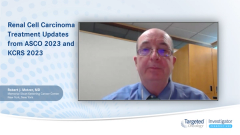
Recent Data on Lenvatinib Plus Pembrolizumab in Advanced RCC
An expert medical oncologist reviews recent data updates on lenvatinib plus pembrolizumab in patients with advanced renal cell carcinoma.
Episodes in this series

Transcript:
Robert J. Motzer, MD: There was a recent update of the CLEAR trial [NCT02811861] with really extended long-term follow-up. The median follow-up was [approximately] 4 years now, which was considerably longer than the initial analysis, the median of which was [approximately] 33 months. So at the 4-year landmark, the findings of the CLEAR trial was that the overall survival [OS] benefit was maintained compared with sunitinib. This was the prespecified final OS analysis on the trial. In addition, the benefits in progression-free survival [PFS] and [OS] were also maintained, and the hazard ratio for benefit for [PFS] was almost 0.5. The response rate remained over 70%, and nearly 20% of patients had a complete remission. This was reported at the recent [American Society of Clinical Oncology Annual] Meeting [in June] and at the KCRS [Kidney Cancer Research Summit]. At KCRS, the focus was a little bit more with regard to responders. In addition to demonstrating that high response rate, the presentation at KCRS also showed that the responses were seen regardless of risk group, many of which were durable, particularly those that were in the setting of a complete response, or what’s called a “deep response,” where there was more than 75% of tumor regression in a partial response. Those 2 groups of patients really did well long term, and I think it was a demonstration of the durability effect of this particular combination of first-line therapy.
This regimen was developed recently. Of these large phase 3 trials that have established [immuno-oncology] combinations in first-line therapy, this was really the last one. There’s always comfort in knowing that the efficacy will be durable, [which is] why the updates with longer follow-up are comforting to show a durability of this particular program in controlling disease and extending survival. There’s debate in terms of which combination to use in the first line. And I think that cannot be definitively said without a clear comparison based on cross-study comparisons between the various regimens, but certainly the lenvatinib-pembrolizumab shows really extraordinary efficacy across the board with a durable effect. And so I think that the update provides comfort in terms of the efficacy and the fact that with long-term follow-up, there were no new safety signals that emerged.
Transcript is AI-generated and edited for clarity and readability.









































